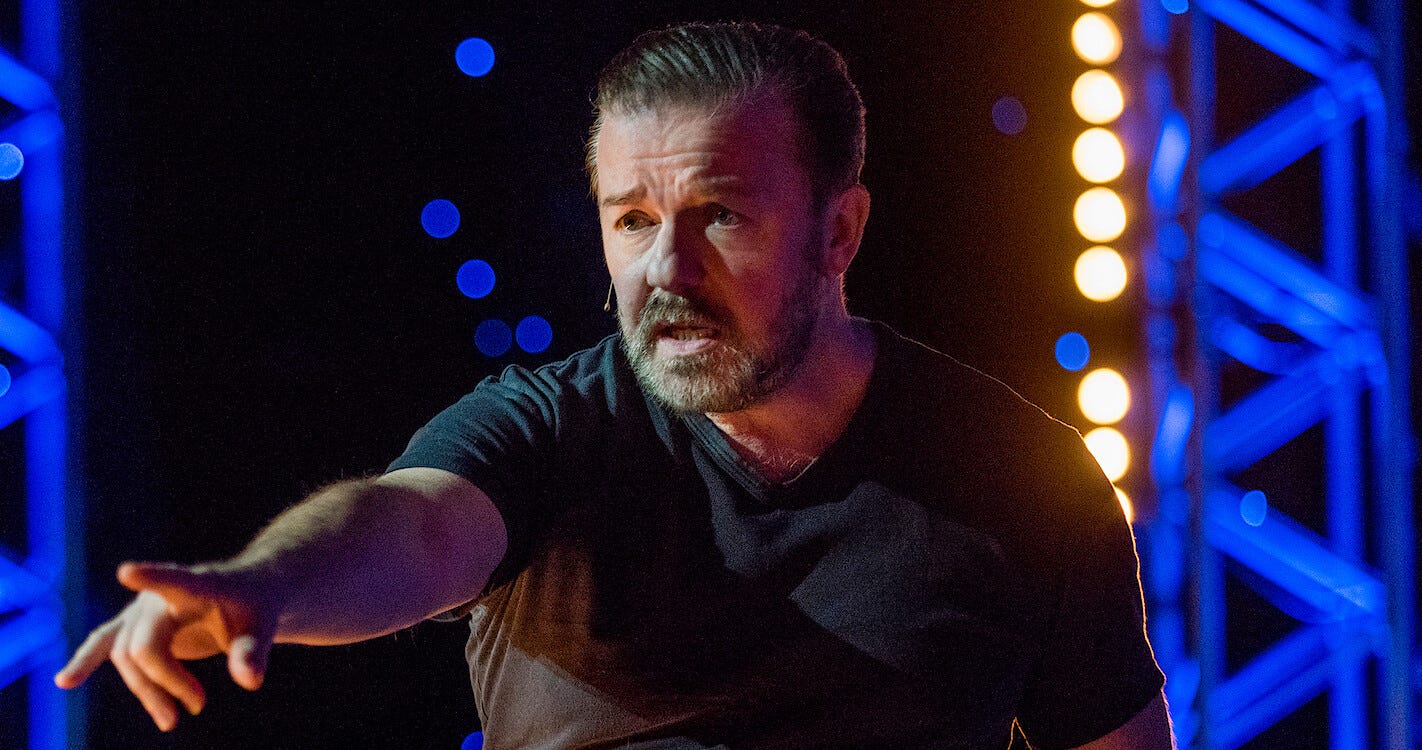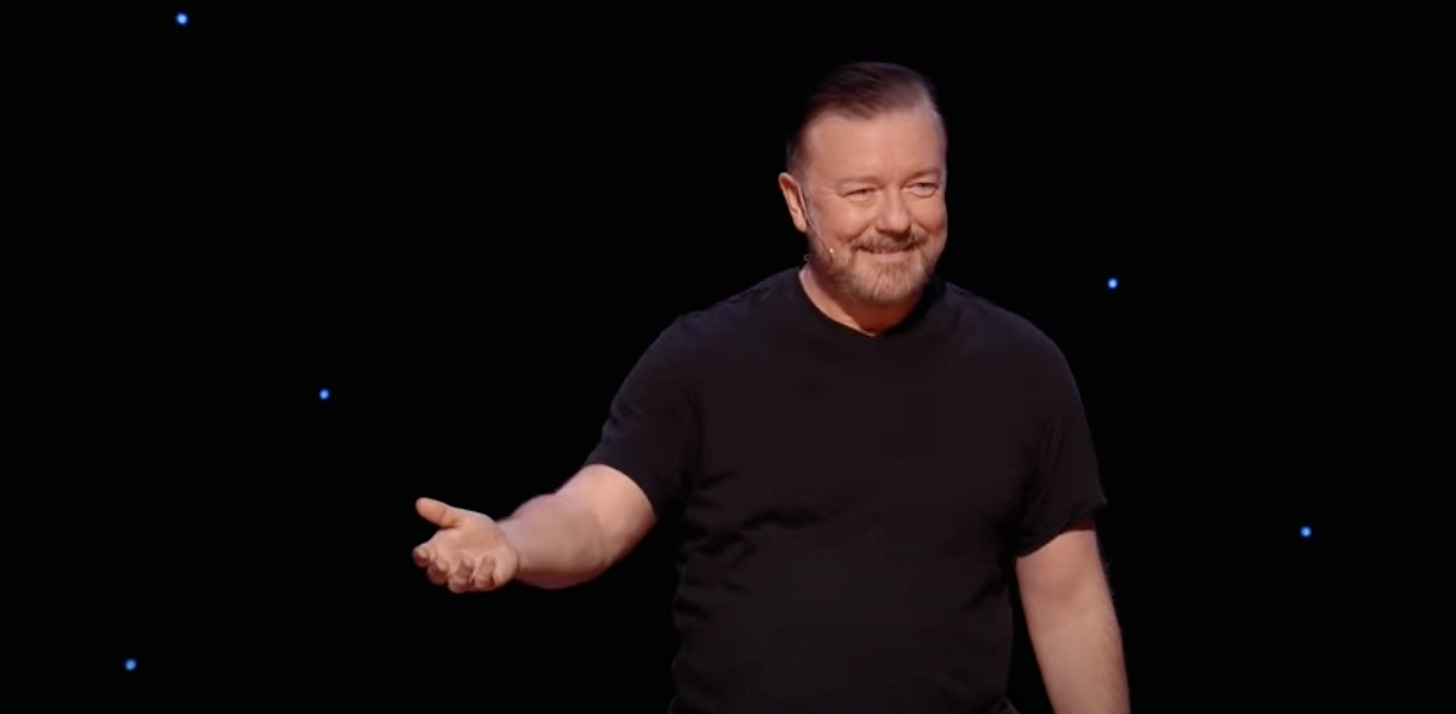I wasn’t going to write this because I’ve seen what happens to people who call for compassion.
But the National Comedy Awards show on Channel 4 on Friday was a cuddly, inclusive affair and the mood in that room has emboldened me.
It used to be such a sour business, that awards show. The comedy silverbacks all gathered in one room, simmering over promotional lager, hurling sarcasm across round tables covered in potential weapons.
It wasn’t that it felt edgy, more like two hours of heartburn with Jonathan Ross.
But not this year. Tom Allen could host the atrium of a Travelodge and you’d go home and recommend the show to neighbours and friends. He’s an includer. Oscar Wilde answering the door in oven gloves, a fresh batch of buns in the kitchen.
(Maybe he just presents a show about baking and doesn’t bake himself, but his vibe is kind and his rejoinders gather everyone in.)
So, there was him. And no silverbacks in attendance. Maybe a Jack Dee or a Bob Mortimer to represent the more experienced practitioners.
All the other big boys had stayed home. Ricky Gervais (we’ll get to it), Lee Mack and so on. They weren’t there. Not that there’s anything wrong with any of them individually (we’ll get to it), but the collective presence of older men used to the old ways, changes that room.
This year there were new awards for impact and inclusion. Winners and presenters included people with disabilities, people of colour, women for god’s sake.
When the audience-voted gongs were handed over to the big hitters, the next tier down went to collect the prizes. At one point, when Afterlife (we’ll get to it) picked up an award, actor Tony Way gamely pointed out that Ricky Gervais only lived a couple of stops up the Northern Line from where the ceremony was taking place. He just couldn’t be bothered to come.
On Twitter I think I saw Gervais say something about it starting too late (it was a live 9pm broadcast) which I suppose is fair enough. But imagine he had been in that room. He would have seemed incongruous against the backdrop of all that compassion.
Let’s talk about harm. Because when we snowflakes melt, it’s often said that we just want to be offended. That we’re looking for reasons to be offended and if we stopped looking for those reasons, we’d have a much better time.
Ricky Gervais, with his fifteen million Twitter followers, millions of pounds in the bank and globally popular television programmes - and on Friday night the definition of too comfortable to leave his north London home - doesn’t think there’s any harm in talking about trans women as “the ones with beards and cocks”.
That was the stink in the room on Friday, in case you weren’t aware. Afterlife won a lot of the prizes and the discomfort in the room became palpable as the night went on. Not among the thousands who voted for his very popular show. But in that room, something was off.
It culminated in the final award when comedian Lolly Adefope stood at the Ghosts table (which had just lost out to Afterlife) and applauded in an exaggerated fashion, Tweeting her congratulations to Gervais after the broadcast while her co-stars laughed, incredulous at it all.
Someone in the room messaged me to say that the warm feel of the night was cut through with a chill by this last award. I could see it. You probably could too if you were watching.
I really felt for all the nice, talented cast members of Afterlife who had to absorb that in the absence of the guy it was actually intended for.
What? His face says as he delivers the stand-up routine about trans women. I won’t link to it. I’m sure you can find it if you’re interested. Gervais doesn’t say what he thinks of trans men because it’s the idea that trans women might have a penis that he’s interested in. He’s just saying. No harm in saying.
And to a rich man who couldn’t be arsed to change out of his slippers to get a 10 minute cab to Camden, I’m sure it feels like there is an active absence of harm in saying. Because really he was drawing attention to the people who stop you from saying trans women might have a penis. He meant no harm to the trans women themselves. He was confronting a taboo.
When he presented his XFM show in the 90s, Gervais and his on-air possé saw a TV documentary about people living with disfigurement. They took particular interest in a young woman featured in the show who lived with a noticeable facial disfigurement.
I won’t name her here because she’s been through enough. But she heard Gervais and his friends talking about her, (or maybe someone told her) making fun of the way she looked. She heard it again the following week, when they brought her up again. And the week after that. Then people started repeating the jokes Gervais had made about her, to her face in the street.
She contacted XFM more than once, hoping to get a message to Gervais and his co-hosts. She tried to explain the misery their banter was causing her. That she didn’t want to go outside anymore. She didn’t hear anything back. They got bored and moved on to someone else.
When I worked in TV in the early 2000s, The 11 O’Clock Show was filming at the studios in my building. Every Thursday night, a section of the staff bar would fill with comedians, writers and crew from the show. I got chatting to some of them.
The 11 O’Clock Show was Gervais’ on-screen breakthrough. He played a sardonic roving reporter.
I remember him sat in the bar one night, holding court at a table, talking about comedy and what was fair game. He said what he still says today: that anything is fair game as long as you make it funny.
Let’s come back to harm. Maybe he’s right. Maybe everything is fair game. But when you smash taboos by pointing out the first, knee-jerk thought of every person watching, you seem to endorse it. The collateral is harm.
He reinforces the beliefs of some of his audience, even if that isn’t his intention. He tells them that the discomfort they feel at something “other” is actually right. That they should go with what their fear is telling them and mistrust someone who doesn’t fit the binary.
He’s so popular. He’s won so many awards. The audiences vote for him year after year and watch his shows and call him a genius.
Everyone is free to choose how they use their time here. He is free to use his immense popularity any way he sees fit. He does a lot of work for animal rights charities.
But I don’t think he can pretend that his words are harmless. They do harm.
If he said, “I’m just breaking taboos. People are going to get hurt,” that would be more honest maybe?
But he refuses to see the ones he harms. He’d direct you to the millions and millions of people enjoying what he does and shrug.
The stink in that room is the same stink as everywhere else. People calling for compassion, asking powerful people not to punch down and the people saying we should get over it.
We’re not looking for the harm. It’s right there.




I love post that make me think.
Seems Comedians think they can say whatever they want.
Well, they can... BUT they have to be able to defend it AS WELL!
Anthony Jeselnik has far, FAR darker jokes then Gervais, but they are not child-like, mean spirited attacks, from the least sophisticated humor on the planet to go for instinctual differences in people that cannot change.
"Ugly" has got to be the least funny thing on the planet after 4 years old.